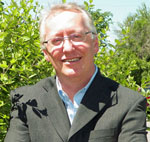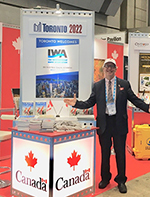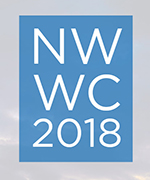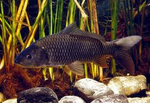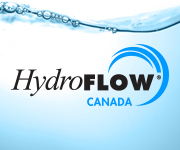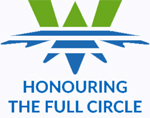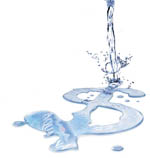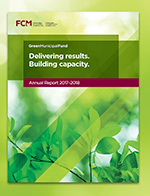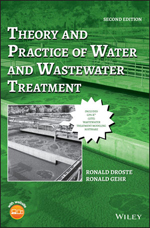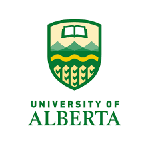 |
||||||||||||||||||||||||||||||||||||||||
| Subscribe | Past Issues | www.cwwa.ca | Water Source Magazine | ||||||||||||||||||||||||||||||||||||||||
|
CWWA News
I have another article in this e-Bulletin about our presence and showing at the IWA’s World Water Congress in Tokyo last week, but I wanted to use this column to speak about my growing appreciation for the IWA – the International Water Association.
CWWA, and our Canadian Partners, made an impressive showing at the World Water Congress & Exhibition in Tokyo September 16th to 20th. This global event is organized every two years by the International Water Association (IWA). The next event will be in Copenhagen, Denmark in 2020 then Canada will host this event in Toronto in 2022.
CWWA is excited to announce our keynote speaker Steve Szucs.
CWWA recently submitted a letter to the Minister of Fisheries and Oceans, asking for more fair and predictable enforment of the deleterious substance provisions of the Fisheries Act. Recently, several CWWA members have been issued warnings or charges for discharge of a deleterious substance due to releases of chlorinated drinking water.
CWWA’s Wastewater Committee recently reviewed a proposal to expand NPRI reporting for releases to water. These changes would see a discharge based threshold for releases to water instead of the current employee threshold. The wastewater sector is already subject to a volume based threshold, so this likely won’t result in any changes for the sector. The other proposal is to expand reporting to include TSS, BOD and COD and to expand reporting to include all substances on the NPRI, regardless of reporting thresholds.
The Smart Water Network Forum (SWAN) the leading global hub for smart water and wastewater sectors, is hosting a half day Workshop at the annual CWWA National Water and Wastewater Conference.
The Canadian Network of Asset Managers (CNAM), in partnership with the Canadian Water and Wastewater Association (CWWA), is providing you with the opportunity to attend a 1-Day Infrastructure Asset Management Awareness and Education Workshop, immediately before the CWWA Conference in Montreal. The workshop will be delivered in English.
Federal Initiatives
Member News
CWWA, through our Utility Leadership Committee, are supporting partners of this financial sustainability project with the Canadian Water Network. Together, we hope to advance our knowledge in this area, but we need your help. We encourage all of our members to participate in this survey. Below is a message from the CWN and a link to the survey.
CWWA congratulates Western Canada Water on their 70th Anniversary. 2018 marks the 7oth WCW Annual Conference, and the establishment of the Association.
Ecofiscal is offering new courses to explore Municipal market based tools for sustainable development. This course is designed to equip municipal employees, as well as federal and provincial employees that work with municipalities, with knowledge of market-based tools that can support sustainable asset management, finance infrastructure investments, and improve environmental outcomes.
FCM’s Green Municipal Fund (GMF) 2017–2018 Annual Report shows how GMF helps cities and communities of all sizes across Canada reach their sustainability goals, enhance the quality of life of their residents, and provide cleaner air, water and land. Learn how GMF supports municipalities through funding, training, knowledge-sharing and more.
The second edition of the popular textbook "Theory and Practice of Water and Wastewater Treatment" (John Wiley & Sons) will be available by the end of August, just in time for the fall semester. Co-authors are Ronald Droste and Ronald Gehr. The book has been fully updated and is suitable as a senior-level undergraduate text, thoroughly covering both water and wastewater treatment. Included is a fully-functional Lite version of the internationally acclaimed GPS-X wastewater treatment modelling software from Hydromantis. Available as an e-book and hard cover, with solutions manual for instructors.
Aside from being a recent high school graduate from East Northumberland Secondary School, in Brighton, Ontario, I am an active voice for wastewater treatment and its infrastructure. Whether it is talking about my science fair findings or educating elementary students that Toilets are not Garbage Cans, I have been communicating about the environmental impact and cost of abusing our sewer systems with non-flushables, for the past five years. I am passionate about this wasterwater environment issue and founded the Red Fish Route as a solution to this problem; where my main focus is to teach environmentally sustainable flushing habits to the next generation. I seize any opportunity to spread my knowledge on this topic. Snippings & Clippings
Water Canada New opinion data finds that long-term water management is top of mind for many British Columbians. The findings are published in the 2018 BC Water Polling Report. Therein, it’s reported that 87 per cent of respondents believe the province will face a serious problem if nothing is done to improve the management of water resources in BC. This has increased from 76 per cent in 2013, according to polling results released by the Canadian Freshwater Alliance (CFA). Water Canada On August 8th, a thunderstorm produced 72 millimeters of rain over Toronto, with 51 millimeters falling in just one hour. The Insurance Bureau of Canada (IBC) has released information that the rainfall, which caused extensive flooding across western and central parts of the city, resulted in over $80 million in insured damage. Water Canada When talking about fresh water in Canada, rivers and lakes come to mind first, but we often overlook one of the most important environments for water in Canada, wetlands. Wetlands represent 14 per cent of Canada’s landmass, and provide invaluable filtered and purified water to our streams, rivers, lakes, and aquifers. On top of that, wetland ecosystems are the most productive water purification system in the world, capable of providing more biological productivity per acre than tropical rainforests and coral reefs. Water Canada For over 25 years ECO Canada (Environmental Careers Organization) has helped nurture the environmental sector by connecting professionals to training programs, certifications, career development resources and labour market research. Water Canada The Government of Canada has released its first dataset under Canada’s Core Public Infrastructure (CCPI) survey in an effort to build its public infrastructure knowledge base. François-Philippe Champagne, Minister of Infrastructure and Communities, welcomed the release of the data. The survey was a commitment made in Budget 2016 to support a more evidence and results-based approach to public infrastructure policies, programs and investment decisions. Water Online At least 215 billion liters of raw sewage were spilled or leaked into Canadian waterways last year, according to data submitted to the government. Water Online A lot of attention has been drawn recently to microplastics in freshwater and marine environments, and the threat they pose to ecosystems and people’s health. Water Canada North American forest fires have achieved unprecedented scale in 2018. New research funding from the Natural Sciences and Engineering Research Council of Canada’s (NSERC) Strategic Partnership Grant for Networks will aim to provide water security solutions amidst catastrophic fires and other climatic disasters. CWWA Member Profiles
Locating underground services by using a cable and pipe locator before excavating improves safety, saves time and reduces costs by lowering the number of cable and pipe strikes during excavation. Our White Paper: "Reducing Damage to Underground Cables and Pipes" highlights how to use the best tools to focus on improving the safety of your locating teams' performance. |
||||||||||||||||||||||||||||||||||||||||
